模块5 Unit 1 Getting along with others Welcome to the unit课件(38张)
文档属性
| 名称 | 模块5 Unit 1 Getting along with others Welcome to the unit课件(38张) |  | |
| 格式 | zip | ||
| 文件大小 | 448.2KB | ||
| 资源类型 | 教案 | ||
| 版本资源 | 牛津译林版 | ||
| 科目 | 英语 | ||
| 更新时间 | 2019-07-27 17:06:19 | ||
图片预览

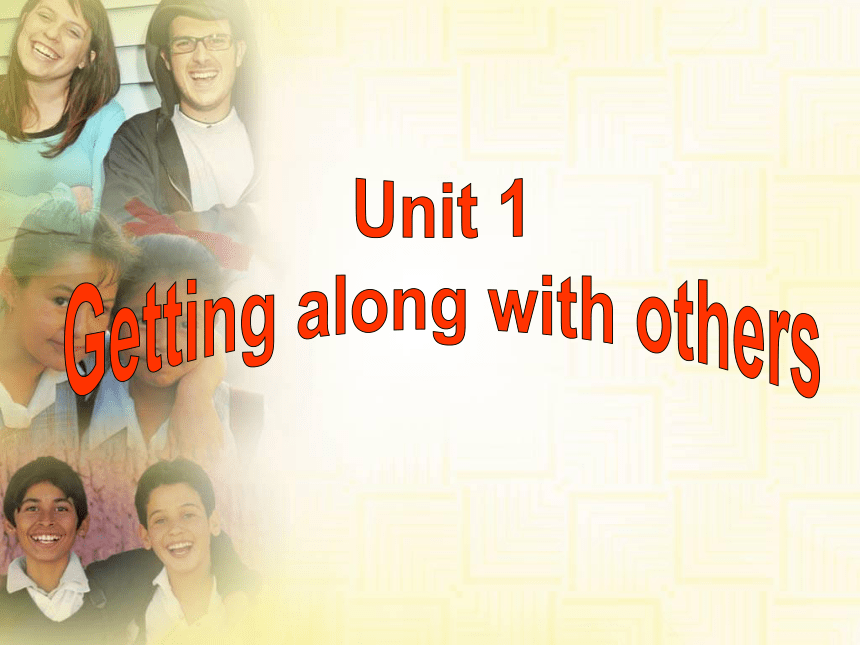

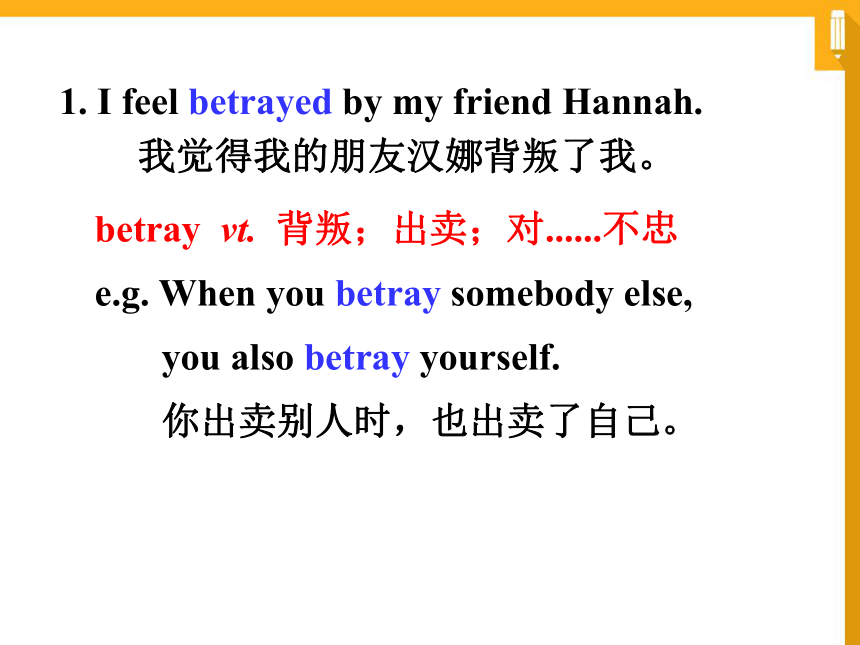
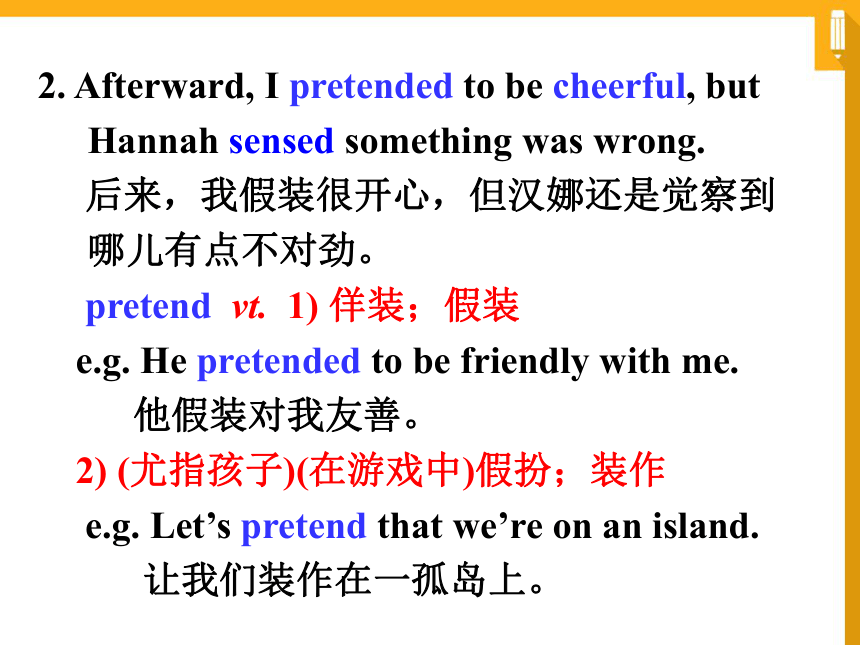

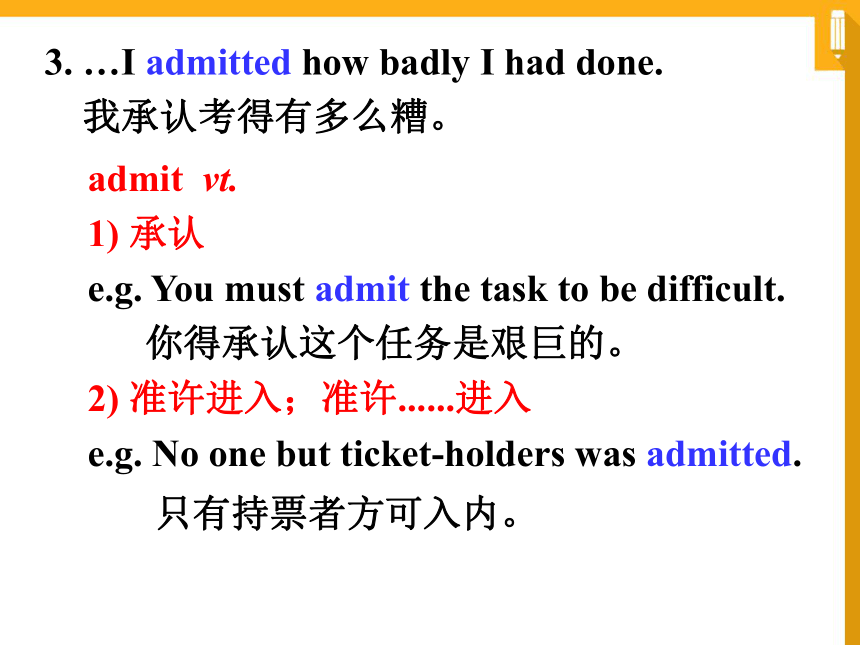
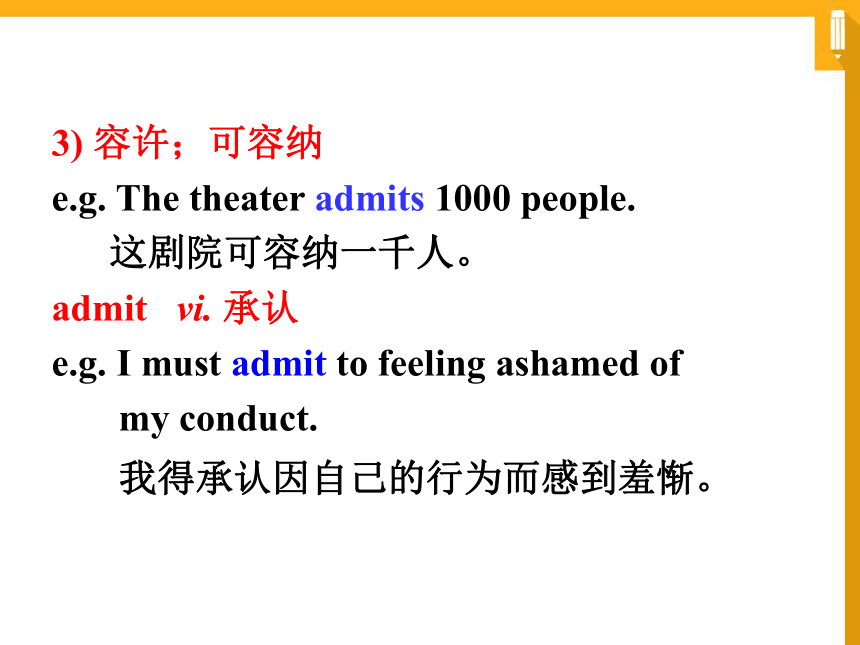
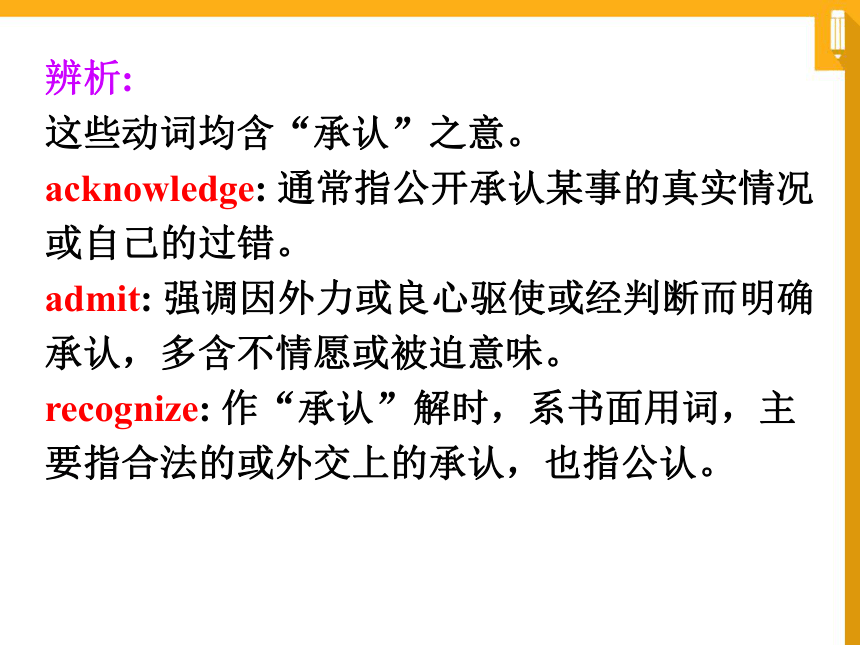
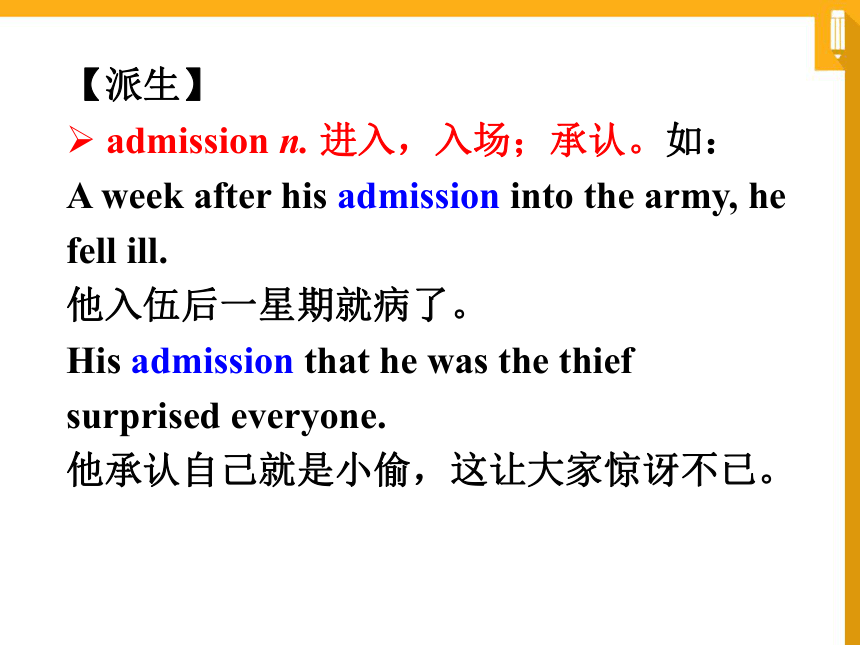

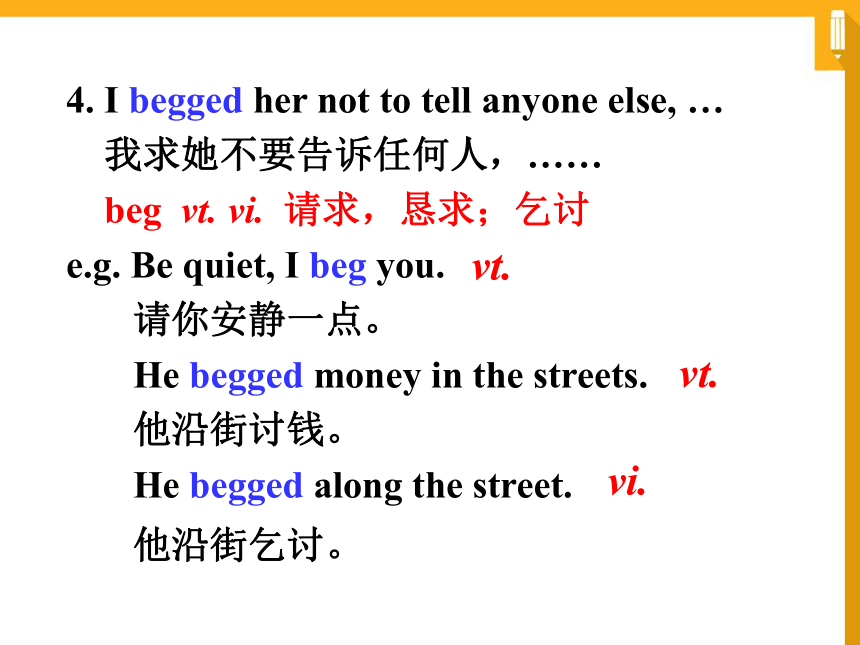
文档简介
课件38张PPT。Unit 1Unit 1
Getting along with othersLanguage points1. I feel betrayed by my friend Hannah. 我觉得我的朋友汉娜背叛了我。betray vt. 背叛;出卖;对......不忠
e.g. When you betray somebody else,
you also betray yourself.
你出卖别人时,也出卖了自己。2. Afterward, I pretended to be cheerful, but Hannah sensed something was wrong.
后来,我假装很开心,但汉娜还是觉察到哪儿有点不对劲。
pretend vt. 1) 佯装;假装
e.g. He pretended to be friendly with me.
他假装对我友善。
2) (尤指孩子)(在游戏中)假扮;装作
e.g. Let’s pretend that we’re on an island.
让我们装作在一孤岛上。 cheerful adj. 愉快的,高兴的;令人愉快的
e.g. This is a cheerful, sunny room. 这个房间阳光充足,令人愉快。
句中的 sense 为动词,后接从句,表示“感觉到,意识到”。
e.g. She probably sensed that I wasn’t
telling her the whole story.
她可能意识到我没有告诉她整个故事。3. …I admitted how badly I had done. 我承认考得有多么糟。admit vt. 1) 承认
e.g. You must admit the task to be difficult. 你得承认这个任务是艰巨的。
2) 准许进入;准许......进入
e.g. No one but ticket-holders was admitted. 只有持票者方可入内。 3) 容许;可容纳
e.g. The theater admits 1000 people. 这剧院可容纳一千人。
admit vi. 承认
e.g. I must admit to feeling ashamed of
my conduct. 我得承认因自己的行为而感到羞惭。 辨析:
这些动词均含“承认”之意。
acknowledge: 通常指公开承认某事的真实情况或自己的过错。
admit: 强调因外力或良心驱使或经判断而明确承认,多含不情愿或被迫意味。
recognize: 作“承认”解时,系书面用词,主要指合法的或外交上的承认,也指公认。【派生】
admission n. 进入,入场;承认。如:
A week after his admission into the army, he fell ill.
他入伍后一星期就病了。
His admission that he was the thief surprised everyone.
他承认自己就是小偷,这让大家惊讶不已。 admitted adj. 自己承认的
如:He is an admitted alcoholic.
他自认是个酒鬼。
admittedly adv. 无可否认地,诚然。
如:Admittedly, I’ve never actually
been there.
说实在的,我从未去过那里。4. I begged her not to tell anyone else, …
我求她不要告诉任何人,……
beg vt. vi. 请求,恳求;乞讨
e.g. Be quiet, I beg you.
请你安静一点。
He begged money in the streets.
他沿街讨钱。
He begged along the street.
他沿街乞讨。 vt. vt. vi.5. She was really upset and swore that she hadn’t told anyone. 她很不安,发誓说她没有告诉任何人。swear vt. vi. 发誓;郑重承诺;咒骂,说脏话
e.g. The witness swore to tell the truth. 证人起誓保证讲真话。
They refused to swear on a Bible. 他们拒绝手按《圣经》发誓。
What is the woman swearing at? 那女人在咒骂什么? vt. vi. vi. swear – swore - sworn6. I don’t think I can ever truly forgive her. 我想我永远不会真正的原谅她。forgive vt. 原谅,宽恕
e.g. He forgave her for what she had said
to him. 他原谅她对他说过的那些话。 forgive — forgave — forgiven7. Yours sincerely
你真诚的
sincerely adv. 真诚地
e.g. I sincerely hope you’ll come with us. 我真诚希望你和我们一起去。
8. The other team was superb and…
那支球队很棒……
superb adj. 极佳的;卓越的
e.g. She’s a superb singer.
她是一位超级歌星。9. We really had to focus. 我们必须集中精力。focus vt. vi. 集中注意力于……;使聚焦
e.g. I can’t focus my thoughts today. 今天我的思想集中不起来。
He must be very tired today, he doesn’t
seem to focus at all.
他今天一定很累,他似乎无法专心思考。 vt. vi.focus n. 焦点;重点
e.g. The focus of this chapter is the
American Revolution. 本章的重点是讲美国独立战争。 10. I shouldn’t talk to him in this manner.
我不该以这种方式和他说话。
manner n. 方式;态度,举止
e.g. We walked in a leisurely manner. 我们慢悠悠地走着。
11. …it turned into a horrible argument.
……它变成了可怕的争执。
horrible adj. 极坏的, 糟糕的;恐怖
的,令人震惊的
e.g. It is a horrible thing to see one person
make another suffer. 看到人折磨人的景象是件可怕的事。 12. I feel really guilty because I made some cruel remarks too.
我感到很内疚,因为我也说了一些残酷无情 的话。
guilty adj 内疚的;有罪的
e.g. I felt guilty after breaking my promise.
我违背诺言后感到内疚。
He was found guilty. 他被判有罪。
remark n. vi. 评论,谈论
e.g. He had a habit of making humorous remarks. 他有说幽默话的习惯。 13. Since we argued, he hasn’t spoken to me…
自从吵架后,他便没有和我说过话……
argue vi. 争吵,争论
e.g. I’m not going to argue with you tonight. 我今晚不想与你争辩。
14. It’s really awkward.
这实是在令人尴尬。
awkward adj. 令人尴尬的,别扭的;笨拙的
e.g. He felt awkward and uncomfortable. 他感到尴尬和不舒服。 15. …, but he has not apologized to me.
……,但他并未向我道歉。
apologize vi. 道歉
e.g. He apologized to her for not going to her party. 他因为没有出席她举行的宴会而向她表示歉意。 16. I told my brother about the quarrel.
我把吵架的事告诉了我哥哥。
quarrel n. vi. 争吵,争执
e.g. He is good-natured and has never had a quarrel with anyone. 他脾气很好,从不和任何人争吵。
It’s no use quarrelling about it with me. 关于这件事与我争吵毫无用处。 17. She said that someone must have
been spying on us in the washroom, but I
didn’t believe her explanation.
她说一定是有人在洗手间偷听我们的谈
话,但我不相信她的解释。
句中情态动词 must 后面接完成进行式,
表示对过去正在进行的情况的推测。spy
on somebody,“窥探”。如:
Betty always feels that her neighbours
are spying on her.18. He got annoyed, saying it wasn’t his
fault if he couldn’t play as well as me, and
that I shouldn’t talk to him in this manner.
他也被惹火了,说如果他的球技不如我那可不是他的错,还说我不该以这种方式和他说话。
句中现在分词短语作状语。现在分词saying 后接了两个宾语从句,其中第二个从句的引导词 that 通常不能省略。如:
Jack said he loved music and that he would
do anything to become a musician.19. He accused me of some really bad things
just to hurt me.
他指责我做了一些非常不好的事情,只是
为了伤害我。
accuse “指责,指控”,常用于 accuse sb.
of sth. 如:
Are you accusing me of lying?
20. Yesterday, I saw him talking to another boy, Peter, and I cannot help wondering if he wants peter to be his best friend instead of me.
昨天我看见他和另一个男孩彼得说话,我不禁想知道他是不是想让彼得取代我做他最好的朋友。
cannot help (doing) something “忍不住,情不自禁” 如:
I could not help laughing when I saw his haircut.难句分析:
I must have sounded very proud of myself after the quiz, saying how easy it was and how I was sure to get a good grade.
考试之后,我一定是听上去洋洋得意,说考题实在太简单了,我肯定能去的好成绩。
1) 句子结构分析:
此句的主句是I must have sounded very proud
of myself。after the test 是介词短语作时间状
语。-ing分词短语saying how easy it was and how I was sure to get a good grade作伴随状语,修饰谓语动词sound。在-ing分词短语中含有两个how引导的从句作动词say的宾语。2) 语言知识分析:
must have done意为“一定是……”,是对过去发生的情况的肯定推测,其否定结构为can’t / couldn’t have done,意为“不可能……”。如:
Jack can’t have arrived. Otherwise he would have phoned me.
杰克不可能已经到了。要是到了他会给我打电话的。 2. However, the next day, I noticed that my
classmates were staring at me as I came
into math class and, when I went to sit
down, I was shocked to find a piece of
paper on my desk that said, ‘Stupid Sarah
got a D!’
但是第二天,当我走进数学课教室时,我
就注意到同学们在盯着我看。当我坐下
时,我惊讶地发现桌子上有一张纸条,上
面写着:“笨蛋萨拉得了D等!”【分析】 这是一个由and连接的并列复合句。
在第一个分句However ... math class中,that引导宾语从句,其中,as引导时间状语从句;在第二个分句中,when引导时间状语从句,I was shocked ...是主句,其中, that said ...是限制性定语从句,修饰paper。3. I was so angry that I went straight to
Hannah and told her we weren’t going to be
friends any more because she couldn’t keep
her word.
我非常生气,径直走到汉娜跟前,告诉她
我们不再是朋友了,因为她不能信守诺言。
1) 句子结构分析:
此句的主句是一个so ... that ... 句型。 and连
接that结果状语从句里的两个动词went 和
told; told后跟省略了that的宾语从句。2) 语言知识分析:
keep one’s word 意为“遵守诺言”。如:
You must keep your word if you promised to take the children to the cinema.
如果你答应孩子们去看电影的话,你就得遵守诺言。[拓展]
word常见短语还有:have a word with sb.跟……说话;have words with 跟……争吵;break one’s word 不遵守诺言,失信;eat one’s words收回自己的话,承认说错了;leave word留下话;in a word 总之;in other words换句话说等。4. I told my brother about the quarrel, but he
said Matthew is just too sensitive and
perhaps a little bitter because I am really
athletic and good at football and that I had
better find another friend.
我把吵架的事告诉了我哥哥,但他只是说马
修太敏感,可能还有一点嫉妒,因为我身强
体壮,足球踢得很好。他说我最好另找一个
朋友。
1) 句子结构分析:
此句的主句是I told my brother about the quarrel,but he said ... 后面是but引导的并列句,表转折关系。在but引导的转折句中,动词said后是由and连接的两个that引导的宾语从句,第一个宾语从句Matthew is just too sensitive ... 省略了引导词that;第二个宾语从句that I had better find another friend中的that不能省略;because引导的原因状语从句包含于第一个宾语从句Matthew is just too sensitive and perhaps a little bitter中。2) 语言知识分析:
当一个动词后接两个由that引导的宾语从句时,第一个从句的that可以省略,第二个从句的that不能省。如:
My teacher told me (that) I got an A in the English text and that he was satisfied with my result.
我的老师告诉我我的英语测试得了“A”,而且还告诉我他对这个成绩很满意。
Getting along with othersLanguage points1. I feel betrayed by my friend Hannah. 我觉得我的朋友汉娜背叛了我。betray vt. 背叛;出卖;对......不忠
e.g. When you betray somebody else,
you also betray yourself.
你出卖别人时,也出卖了自己。2. Afterward, I pretended to be cheerful, but Hannah sensed something was wrong.
后来,我假装很开心,但汉娜还是觉察到哪儿有点不对劲。
pretend vt. 1) 佯装;假装
e.g. He pretended to be friendly with me.
他假装对我友善。
2) (尤指孩子)(在游戏中)假扮;装作
e.g. Let’s pretend that we’re on an island.
让我们装作在一孤岛上。 cheerful adj. 愉快的,高兴的;令人愉快的
e.g. This is a cheerful, sunny room. 这个房间阳光充足,令人愉快。
句中的 sense 为动词,后接从句,表示“感觉到,意识到”。
e.g. She probably sensed that I wasn’t
telling her the whole story.
她可能意识到我没有告诉她整个故事。3. …I admitted how badly I had done. 我承认考得有多么糟。admit vt. 1) 承认
e.g. You must admit the task to be difficult. 你得承认这个任务是艰巨的。
2) 准许进入;准许......进入
e.g. No one but ticket-holders was admitted. 只有持票者方可入内。 3) 容许;可容纳
e.g. The theater admits 1000 people. 这剧院可容纳一千人。
admit vi. 承认
e.g. I must admit to feeling ashamed of
my conduct. 我得承认因自己的行为而感到羞惭。 辨析:
这些动词均含“承认”之意。
acknowledge: 通常指公开承认某事的真实情况或自己的过错。
admit: 强调因外力或良心驱使或经判断而明确承认,多含不情愿或被迫意味。
recognize: 作“承认”解时,系书面用词,主要指合法的或外交上的承认,也指公认。【派生】
admission n. 进入,入场;承认。如:
A week after his admission into the army, he fell ill.
他入伍后一星期就病了。
His admission that he was the thief surprised everyone.
他承认自己就是小偷,这让大家惊讶不已。 admitted adj. 自己承认的
如:He is an admitted alcoholic.
他自认是个酒鬼。
admittedly adv. 无可否认地,诚然。
如:Admittedly, I’ve never actually
been there.
说实在的,我从未去过那里。4. I begged her not to tell anyone else, …
我求她不要告诉任何人,……
beg vt. vi. 请求,恳求;乞讨
e.g. Be quiet, I beg you.
请你安静一点。
He begged money in the streets.
他沿街讨钱。
He begged along the street.
他沿街乞讨。 vt. vt. vi.5. She was really upset and swore that she hadn’t told anyone. 她很不安,发誓说她没有告诉任何人。swear vt. vi. 发誓;郑重承诺;咒骂,说脏话
e.g. The witness swore to tell the truth. 证人起誓保证讲真话。
They refused to swear on a Bible. 他们拒绝手按《圣经》发誓。
What is the woman swearing at? 那女人在咒骂什么? vt. vi. vi. swear – swore - sworn6. I don’t think I can ever truly forgive her. 我想我永远不会真正的原谅她。forgive vt. 原谅,宽恕
e.g. He forgave her for what she had said
to him. 他原谅她对他说过的那些话。 forgive — forgave — forgiven7. Yours sincerely
你真诚的
sincerely adv. 真诚地
e.g. I sincerely hope you’ll come with us. 我真诚希望你和我们一起去。
8. The other team was superb and…
那支球队很棒……
superb adj. 极佳的;卓越的
e.g. She’s a superb singer.
她是一位超级歌星。9. We really had to focus. 我们必须集中精力。focus vt. vi. 集中注意力于……;使聚焦
e.g. I can’t focus my thoughts today. 今天我的思想集中不起来。
He must be very tired today, he doesn’t
seem to focus at all.
他今天一定很累,他似乎无法专心思考。 vt. vi.focus n. 焦点;重点
e.g. The focus of this chapter is the
American Revolution. 本章的重点是讲美国独立战争。 10. I shouldn’t talk to him in this manner.
我不该以这种方式和他说话。
manner n. 方式;态度,举止
e.g. We walked in a leisurely manner. 我们慢悠悠地走着。
11. …it turned into a horrible argument.
……它变成了可怕的争执。
horrible adj. 极坏的, 糟糕的;恐怖
的,令人震惊的
e.g. It is a horrible thing to see one person
make another suffer. 看到人折磨人的景象是件可怕的事。 12. I feel really guilty because I made some cruel remarks too.
我感到很内疚,因为我也说了一些残酷无情 的话。
guilty adj 内疚的;有罪的
e.g. I felt guilty after breaking my promise.
我违背诺言后感到内疚。
He was found guilty. 他被判有罪。
remark n. vi. 评论,谈论
e.g. He had a habit of making humorous remarks. 他有说幽默话的习惯。 13. Since we argued, he hasn’t spoken to me…
自从吵架后,他便没有和我说过话……
argue vi. 争吵,争论
e.g. I’m not going to argue with you tonight. 我今晚不想与你争辩。
14. It’s really awkward.
这实是在令人尴尬。
awkward adj. 令人尴尬的,别扭的;笨拙的
e.g. He felt awkward and uncomfortable. 他感到尴尬和不舒服。 15. …, but he has not apologized to me.
……,但他并未向我道歉。
apologize vi. 道歉
e.g. He apologized to her for not going to her party. 他因为没有出席她举行的宴会而向她表示歉意。 16. I told my brother about the quarrel.
我把吵架的事告诉了我哥哥。
quarrel n. vi. 争吵,争执
e.g. He is good-natured and has never had a quarrel with anyone. 他脾气很好,从不和任何人争吵。
It’s no use quarrelling about it with me. 关于这件事与我争吵毫无用处。 17. She said that someone must have
been spying on us in the washroom, but I
didn’t believe her explanation.
她说一定是有人在洗手间偷听我们的谈
话,但我不相信她的解释。
句中情态动词 must 后面接完成进行式,
表示对过去正在进行的情况的推测。spy
on somebody,“窥探”。如:
Betty always feels that her neighbours
are spying on her.18. He got annoyed, saying it wasn’t his
fault if he couldn’t play as well as me, and
that I shouldn’t talk to him in this manner.
他也被惹火了,说如果他的球技不如我那可不是他的错,还说我不该以这种方式和他说话。
句中现在分词短语作状语。现在分词saying 后接了两个宾语从句,其中第二个从句的引导词 that 通常不能省略。如:
Jack said he loved music and that he would
do anything to become a musician.19. He accused me of some really bad things
just to hurt me.
他指责我做了一些非常不好的事情,只是
为了伤害我。
accuse “指责,指控”,常用于 accuse sb.
of sth. 如:
Are you accusing me of lying?
20. Yesterday, I saw him talking to another boy, Peter, and I cannot help wondering if he wants peter to be his best friend instead of me.
昨天我看见他和另一个男孩彼得说话,我不禁想知道他是不是想让彼得取代我做他最好的朋友。
cannot help (doing) something “忍不住,情不自禁” 如:
I could not help laughing when I saw his haircut.难句分析:
I must have sounded very proud of myself after the quiz, saying how easy it was and how I was sure to get a good grade.
考试之后,我一定是听上去洋洋得意,说考题实在太简单了,我肯定能去的好成绩。
1) 句子结构分析:
此句的主句是I must have sounded very proud
of myself。after the test 是介词短语作时间状
语。-ing分词短语saying how easy it was and how I was sure to get a good grade作伴随状语,修饰谓语动词sound。在-ing分词短语中含有两个how引导的从句作动词say的宾语。2) 语言知识分析:
must have done意为“一定是……”,是对过去发生的情况的肯定推测,其否定结构为can’t / couldn’t have done,意为“不可能……”。如:
Jack can’t have arrived. Otherwise he would have phoned me.
杰克不可能已经到了。要是到了他会给我打电话的。 2. However, the next day, I noticed that my
classmates were staring at me as I came
into math class and, when I went to sit
down, I was shocked to find a piece of
paper on my desk that said, ‘Stupid Sarah
got a D!’
但是第二天,当我走进数学课教室时,我
就注意到同学们在盯着我看。当我坐下
时,我惊讶地发现桌子上有一张纸条,上
面写着:“笨蛋萨拉得了D等!”【分析】 这是一个由and连接的并列复合句。
在第一个分句However ... math class中,that引导宾语从句,其中,as引导时间状语从句;在第二个分句中,when引导时间状语从句,I was shocked ...是主句,其中, that said ...是限制性定语从句,修饰paper。3. I was so angry that I went straight to
Hannah and told her we weren’t going to be
friends any more because she couldn’t keep
her word.
我非常生气,径直走到汉娜跟前,告诉她
我们不再是朋友了,因为她不能信守诺言。
1) 句子结构分析:
此句的主句是一个so ... that ... 句型。 and连
接that结果状语从句里的两个动词went 和
told; told后跟省略了that的宾语从句。2) 语言知识分析:
keep one’s word 意为“遵守诺言”。如:
You must keep your word if you promised to take the children to the cinema.
如果你答应孩子们去看电影的话,你就得遵守诺言。[拓展]
word常见短语还有:have a word with sb.跟……说话;have words with 跟……争吵;break one’s word 不遵守诺言,失信;eat one’s words收回自己的话,承认说错了;leave word留下话;in a word 总之;in other words换句话说等。4. I told my brother about the quarrel, but he
said Matthew is just too sensitive and
perhaps a little bitter because I am really
athletic and good at football and that I had
better find another friend.
我把吵架的事告诉了我哥哥,但他只是说马
修太敏感,可能还有一点嫉妒,因为我身强
体壮,足球踢得很好。他说我最好另找一个
朋友。
1) 句子结构分析:
此句的主句是I told my brother about the quarrel,but he said ... 后面是but引导的并列句,表转折关系。在but引导的转折句中,动词said后是由and连接的两个that引导的宾语从句,第一个宾语从句Matthew is just too sensitive ... 省略了引导词that;第二个宾语从句that I had better find another friend中的that不能省略;because引导的原因状语从句包含于第一个宾语从句Matthew is just too sensitive and perhaps a little bitter中。2) 语言知识分析:
当一个动词后接两个由that引导的宾语从句时,第一个从句的that可以省略,第二个从句的that不能省。如:
My teacher told me (that) I got an A in the English text and that he was satisfied with my result.
我的老师告诉我我的英语测试得了“A”,而且还告诉我他对这个成绩很满意。
